- Home
- Ben Stevens
The Ennin Mysteries: Collected Series 1 – 5 (25 Stories) MEGAPACK
The Ennin Mysteries: Collected Series 1 – 5 (25 Stories) MEGAPACK Read online
The Ennin Mysteries: Series 1 – 5 (25 Stories) MEGAPACK
Ben Stevens
SERIES 1
The Cursed Temple
The Man Who Was Scared of the Wind
The Empress and the Monk
The Ninja
The Demon King
SERIES 2
The Sixth Buddha
The Picture of Death
Buddha’s Hammer
The Invisible Assassin
The Black Death
SERIES 3
The Dark Scrolls
The Forty-eighth Ronin
The Geisha and the Vampire
The Water Barrel
The Mountain Killer
SERIES 4
The River-dancer
The Touch of Death
Wabi-sabi
The Mad Dog Sickness
The Rain Player
SERIES 5
Attack of the 60-foot Buddha
A Slave’s Tale
The Sun Thief
The Toymaker
The Poet
Amazon author account
SERIES 1
The Cursed Temple
1
I still see that face in my nightmares. Twisted almost out of recognition; the mouth frozen in a silent scream. The eyes wide and staring, transfixed by some nameless horror.
Even my master – famous for his iron nerves – could not repress a slight shudder, as we both stared down at the body of the young monk lying on the futon.
‘Who discovered this man?’ asked my master quietly.
‘I did,’ replied the head-priest, a man in his mid-sixties. Stood beside him was the senior monk, who looked to be about ten years younger.
‘Isuke – that was his name – failed to come to the morning service in the main hall,’ continued the priest. ‘I thought that perhaps he was just sick in bed – especially given that strange habit he’d recently developed… But a few hours after the service, when no one had seen him still, I entered this room and…’
My master nodded.
‘I see, Jushoku,’ he said, addressing the priest by his formal title. ‘You mention a ‘strange habit’…?’
The priest now appeared slightly uncomfortable. It seemed to me that the senior monk (who’d given his name as Katamari) was also looking pointedly at his senior. As though cautioning the priest not to say too much…
‘Whether it is the rainy season or not, this region sees frequent showers,’ began the priest. ‘Especially as we have now entered autumn. Isuke would go out in heavy rain, and so return almost wringing wet. Why he did this, I do not know. Several times I had stern words with him about it, but he seemed…’
The priest shook his head, and then said passionately –
‘He seemed consumed! As though he was struggling with something – some thought, perhaps – that was torturing him…’
‘We are fortunate that you happened to be lodged at a nearby inn, Ennin-sensei,’ broke in the senior monk Katamari. ‘We – that is, all of us at this humble temple – are also deeply obliged to you for having come here at the Jushoku’s request. But as you can see, there is nothing here that requires your legendary powers of deduction...’
These last few words, as politely delivered as they were, still seemed faintly mocking. As though this senior monk suspected that my master was nothing other than a charlatan.
My master looked pointedly at Katamari.
‘Indeed, Katamari-san?’ he returned, his voice even. ‘Am I perhaps missing some obvious cause of death?’
Katamari’s thin lips twitched in a slight, humorless smile.
‘It was the rain – of that I am certain,’ stated the senior monk. ‘All these recent, outdoor trips Isuke made in foul weather caused a fever to suddenly develop within him, after he went to bed last night. Sadly this fever proved too great for his body’s natural defenses, and so he died as he slept.’
‘I’ve seen several people who’ve passed away in their sleep,’ observed my master quietly. ‘And not one had a face like – this.’
I saw anger briefly flash in Katamari’s eyes. He was about to reply, when the priest said suddenly –
‘No, no, Katamari, this won’t do! We have to be open with Ennin-sensei – to trust to the reputation he has throughout Japan!’
Looking directly at my master, he continued: ‘We need your help, Ennin-sensei. For at this moment, it seems as though this temple has a curse upon it. Because not six months before this day, and the discovery of this monk’s body – ’
‘Jushoku,’ broke in my master, ‘I am already aware. For this is the second young monk to be found dead here at this temple within half a year. Only last time, the body of the monk named Matsuo was discovered in the temple main hall, with a similar, horrific expression on his face. Is this not correct?’
2
Sometime later, we were seated in a tatami mat room which had running through its centre a long, low wooden table. The other, less senior monks had already eaten their lunch. A young monk served the priest, Katamari, my master and I with our humble fare.
My master and I had enjoyed excellent food and sake at the nearby inn where we were staying. So I should have been disappointed at the bland vegetables and rice on offer here. As it was, however, the sight of that deceased monk’s face had quite taken away my appetite.
And now there was this talk of another death having occurred at this temple – within the last six months!
‘You seem to know a certain amount about this temple already, Ennin-sensei,’ said the priest carefully.
‘I heard something concerning the death of the previous monk anyway, Jushoku,’ replied my master, his tone equally as cautious. ‘Naturally, I understand that you would hardly want such a matter to become common knowledge. Only the Shining Path branch of Buddhism you practice is so well-known, that…’
My master’s voice tailed discreetly away, as the priest nodded a reluctant understanding. The tense atmosphere in this room accordingly diminished – at least between the priest and my master.
Katamari, however, continued to observe my master with a cold eye.
‘Yes, I suppose you’re right,’ sighed the priest. ‘And a man with such a reputation as yours can only be expected to know about various, mysterious… occurrences.’
When my master failed to reply, I glanced at him. He was staring fixedly at something hanging on the wooden wall. Curious, I followed his gaze to observe an old, hanging scroll.
For a few moments, I struggled to make out the thickly-inked Chinese characters.
Then, I read –
To calm and concentrate
The mind
So one can truly see
What is?
Simplicity
To exist in this place
And yet simultaneously
To be in another
And then to see through this other
And to discover –
What lies beyond?
It was the type of thing you expect to see hanging within a Buddhist temple. Vague words upon which priests and monks like to turn their spiritual attention. Otherwise, there was precious little ‘decoration’ within this room or the rest of this ancient temple that I had seen so far.
One notable exception to this was in the temple’s main entrance. For it was here (after my master – and so I – had been summoned from the nearby inn as a matter of urgency) that I’d noticed the huge mirror bolted onto one of the walls.
Its frame was made from polished metal, skillfully carved into many small fish all biting o
ne another’s tails. This mirror was as wide as a man, and almost as tall. It stood out in a place such as this and I quietly remarked upon it to my master, as we removed our footwear prior to stepping up onto the wooden floor.
‘Chinese in origin, I believe,’ my master had returned, as we handed our wide-brimmed straw hats and cloaks (it was raining today) to the young monk who’d been sent to fetch us. ‘No doubt one of the fabled treasures Gyoja brought back with him, when he finally returned to Japan following his travels through India and China.’
‘Gyoja?’ I said quizzically. The name meant nothing to me – and yet still I’d the feeling that I’d heard it somewhere before.
‘The founder of the Shining Path branch of Buddhism,’ returned my master. ‘He constructed this temple with his followers upon his return to Japan. Now, several hundred years after his death, there are a number of Shining Path temples situated across the country. But this particular temple continues to represent the ‘heart’, so to speak, of the Shining Path branch...’
…The priest surveyed my master with a mixture of confusion and irritation. Then, his broad face again attempting to appear serene, he observed –
‘I see that hanging scroll has caught your attention, Ennin-sensei.’
My master almost started, before giving a slight, embarrassed smile.
‘Excuse me, Jushoku – I did not mean to appear rude. But I take it these words were written by none other than Gyoja himself?’
‘Yes – those are Gyoja-sama’s words,’ nodded the priest, pointedly adding the honorific to the founder’s name. ‘Legend states that whoever can one day understand their true meaning will know all that Gyoja-sama himself knew – and so will be on the path to attaining true Buddhahood.
‘And so,’ concluded the priest, ‘everyone resident at this temple meditates upon these words daily – as has been the case for several hundred years.’
The pupils of my master’s eyes had become like pinpricks – the only outward sign of his inner excitement. Neither the Jushoku nor Katamari had noticed. But I – who had lived and travelled with my master for some years now, often facing mystery and danger alongside him – knew that his keen brain had realized something.
‘Returning to the matter of the deceased monks, Ennin-sensei,’ said the priest politely, but still forcefully. ‘You know why they were here?’
My master nodded.
‘It is my understanding,’ he began, ‘that the priest of this temple chooses a successor from among the monks resident at the other, Shining Path temples.’
‘That is correct,’ said the priest. ‘That has been the tradition for, well, hundreds of years now. A tradition set by Gyoja-sama himself. As the priest at this temple finds himself entering into old age, he invites the priests of the other Shining Path temples, located across Japan, to each recommend one monk to travel here and train as a successor. Assisted by his senior monk – in my case Katamari – the resident priest here then sorts through the various recommendations, and ultimately makes his choice.’
‘I’m a little surprised that the senior monk here is not considered as being an obvious successor,’ observed my master.
This prompted a thin-lipped smile from Katamari, as the priest briefly shook his head.
‘I believe,’ said the priest, ‘that Gyoja-sama decided upon this system so that the hierarchy within this temple never becomes too ‘stale’, as it were. Always an outsider is appointed as the next priest, receiving five years’ training from the existing priest before that priest retires and so hands over control of the temple.
‘And now, not one but two of my appointed successors, gifted with wit and wisdom far beyond their years, are dead! What monk will dare to come to this temple next?’
With this final, despairing question, the priest again shook his head and was silent.
My master appeared briefly sunk in thought. Then he asked –
‘Is it common for the monks here to burn incense within their sleeping quarters?’
Katamari observed my master with drooped eyelids.
‘I’m sorry?’ said the senior monk tightly.
‘Beside Isuke’s futon there was a small brass bowl, with some ash within it,’ returned my master. ‘Clearly, he’d burnt a stick of incense sometime the previous evening.’
The priest now emerged from his sorrow to stare quizzically at my master.
‘Ennin-sensei, please excuse me, but… does this have any bearing on anything?’ asked the priest.
‘Quite possibly not,’ admitted my master. ‘I thought it worth mentioning, but now…’
The awkward atmosphere within the room was interrupted by the arrival of the same young monk who’d served us lunch. He first knocked on the door, and when the priest bade him ‘Come’ slid open the door before respectfully entering on his knees. He shuffled over to the priest, whispering a few words in the elderly man’s ear.
The Jushoku again appeared pained. He waved the young monk away, and then said to my master –
‘And now what I feared would happen, has. One of the monks here has stated his desire to leave this temple. Ennin-sensei, you must excuse me and Katamari – we have to attend to this matter immediately, before every single monk here decides to flee. And, of course, I must also arrange for poor Isuke to receive a proper funeral.’
‘Of course – but I must quickly ask one final thing,’ said my master.
‘Yes?’ said the priest, rising slowly to his feet.
‘You wish for me to try and investigate this matter – to try and discover exactly why two young, apparently healthy monks have died in such a relatively short space of time, and in such mysterious… circumstances?’
The priest’s expression became almost pleading. He appeared now to have forgotten all about my master’s strange (indeed, apparently pointless) question, concerning the burning of the incense.
‘Ennin-sensei, I would be most grateful for any help or explanation you could give,’ said the priest.
‘Of course,’ returned my master. ‘Only, I fear to impose, but it would be helpful if I and my servant could stay here, while I look into this matter…’
‘Naturally,’ said the priest, as Katamari’s cold eyes signaled his disapproval of such an arrangement. ‘I will have one of the monks arrange a room for you. Now, if you’ll excuse me…’
Accompanied by Katamari, he left.
At once, my master stood up, his eyes gleaming.
‘Quickly, Kukai – let us return to the inn, pay our bill and get our few possessions! Although, we cannot truly start work before everyone at this temple has fallen asleep this evening…’
‘Master?’ I said uncertainly. ‘What ‘work’ is this?’
‘You will know,’ returned my master, his voice and expression suddenly grim. ‘There is great danger here – murder and trickery and deception. We have to act quickly…’
I knew when it was appropriate to ask my master questions – and when it was best just to do exactly as he wanted. So without another word we left the tatami dining room, and walked along the wooden corridor towards the main entrance of the temple.
3
The room given to my master and I was as small and plain as that which the dead monk had occupied. Only a few tatami in size, with two futon laid out almost side-by-side.
‘No incense sticks provided – note that, Kukai,’ muttered my master, as (now that we were alone) he began to spread out those peculiar tools of his trade upon one of the futon.
I barely restrained a sigh. He was still obsessed by this matter of the incense sticks! I failed to see what possible relevance this could have to anything, least of all the death of the monk named Isuke.
The temple went to sleep soon after it got dark. Like the poorer samurai, I judged that they did this to preserve the expensive oil for their lamps. We’d been given one such lamp, which shone softly in our small room now, as we waited until it seemed likely that everyone else in the temple was fast asleep.
And then we’d do – what, exactly? I’d still no idea.
I watched as my master carefully ordered all those small, variously-sized blades and tools he’d had call to use in the past. When it was necessary to pick a lock, or something of the sort. At this, like so many things, he was expert.
Then my master put these small tools back in the pouch he used to carry them. He sat down on a futon and looked at me, the deep eyes in that curiously elongated and strikingly bald head again like pinpricks.
‘I have something. When you look at it, it’s there. But when you look for it, it’s not. What is it?’
‘Master…?’ I returned hesitantly.
‘An easy enough riddle,’ yawned my master – something which broke his almost hypnotic expression of before. ‘And something which relates to those words of Gyoja’s, printed on the scroll in the temple’s dining-area, which have had assorted monks and priests scratching their heads in confusion for several hundred years.’
‘You – you know what those words mean?’ I demanded.
My master held up a cautionary hand.
‘We shall see, we shall see,’ he said. ‘In fact, I believe we can set off now.’
‘Where are we going, master?’
‘To that mirror in the main entrance that you so admired upon our arrival earlier. Quietly now! We mustn’t disturb a soul...’
4
The meager flame of the oil lamp flickered ghostlike in the glass of the great mirror. I was holding this lamp – but then my master took it from me, using it to perform a curious, close-up search of the mirror’s frame.
I have already said that this frame was impressively styled. A great number of small, metallic fish, each joined by tail and mouth to two others. I wondered briefly as to what (if anything) this design symbolized; and then my thoughts were distracted as my master made a low noise in his throat, as though something he’d suspected had just been confirmed. But looking at the area of the frame he himself was examining, I could see nothing.

 Hostile Genus: An Epic Military Sci-Fi Series (Invasive Species Book 2)
Hostile Genus: An Epic Military Sci-Fi Series (Invasive Species Book 2)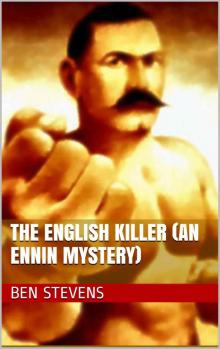 The English Killer (An Ennin Mystery) (The Ennin Mysteries Book 31)
The English Killer (An Ennin Mystery) (The Ennin Mysteries Book 31) The Ennin Mysteries: Collected Series 1 – 5 (25 Stories) MEGAPACK
The Ennin Mysteries: Collected Series 1 – 5 (25 Stories) MEGAPACK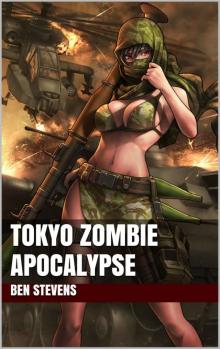 Tokyo Zombie Apocalypse
Tokyo Zombie Apocalypse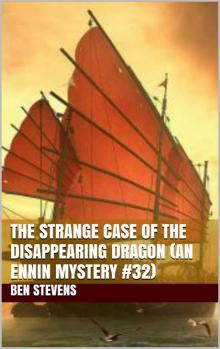 The Strange Case of the Disappearing Dragon (An Ennin Mystery #32)
The Strange Case of the Disappearing Dragon (An Ennin Mystery #32) I, Hell
I, Hell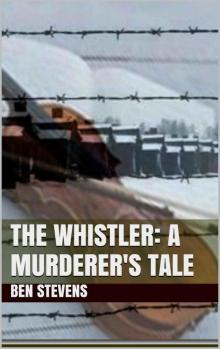 The Whistler: A Murderer's Tale
The Whistler: A Murderer's Tale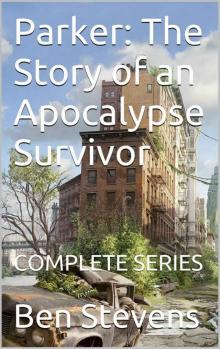 Parker: The Story of an Apocalypse Survivor: COMPLETE SERIES
Parker: The Story of an Apocalypse Survivor: COMPLETE SERIES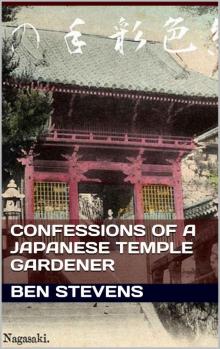 Confessions of a Japanese Temple Gardener: (P.S – Who's from London, England)
Confessions of a Japanese Temple Gardener: (P.S – Who's from London, England)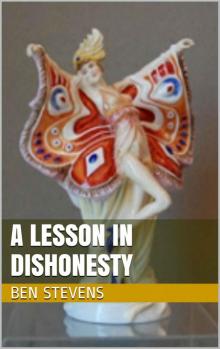 A Lesson in Dishonesty
A Lesson in Dishonesty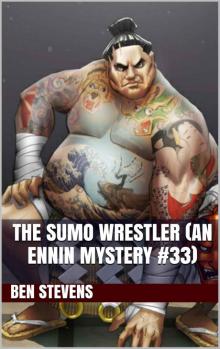 The Sumo Wrestler (An Ennin Mystery #33)
The Sumo Wrestler (An Ennin Mystery #33)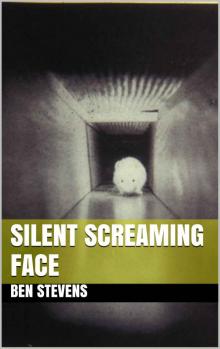 Silent Screaming Face
Silent Screaming Face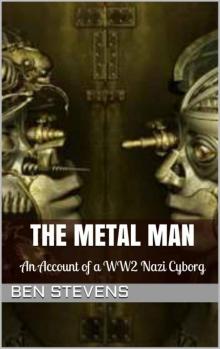 The Metal Man: An Account of a WW2 Nazi Cyborg
The Metal Man: An Account of a WW2 Nazi Cyborg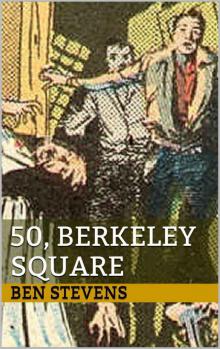 50, Berkeley Square
50, Berkeley Square A Ghost
A Ghost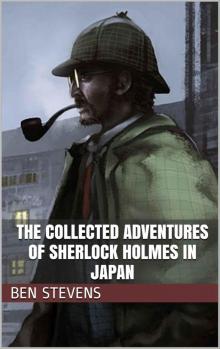 The Collected Adventures of Sherlock Holmes in Japan
The Collected Adventures of Sherlock Holmes in Japan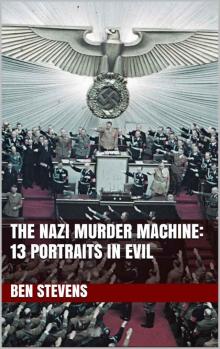 The Nazi Murder Machine: 13 Portraits in Evil
The Nazi Murder Machine: 13 Portraits in Evil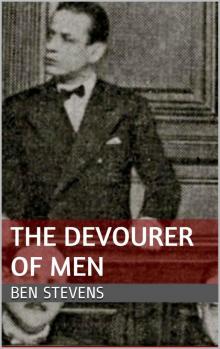 The Devourer of Men
The Devourer of Men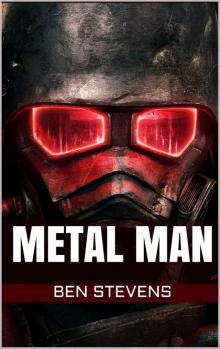 Metal Man
Metal Man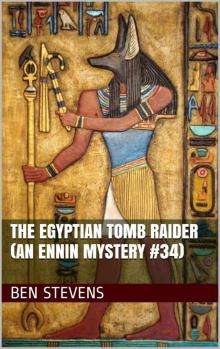 The Egyptian Tomb Raider (An Ennin Mystery #34)
The Egyptian Tomb Raider (An Ennin Mystery #34)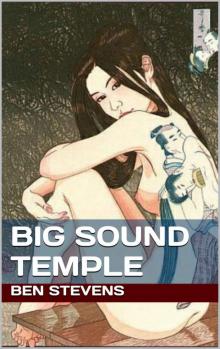 Big Sound Temple
Big Sound Temple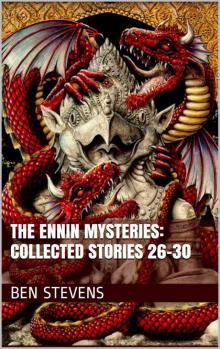 The Ennin Mysteries: Collected Stories 26-30
The Ennin Mysteries: Collected Stories 26-30